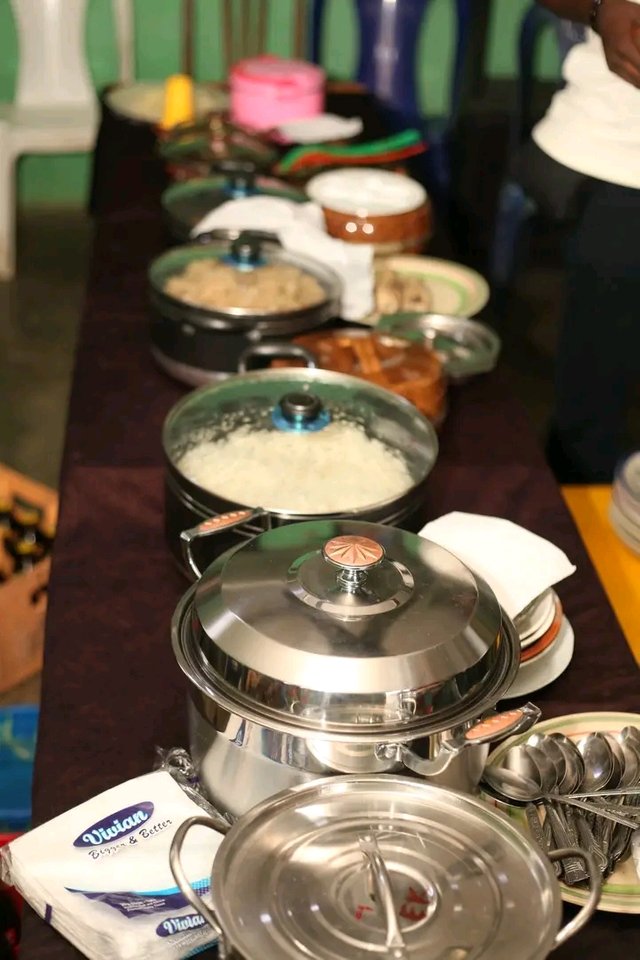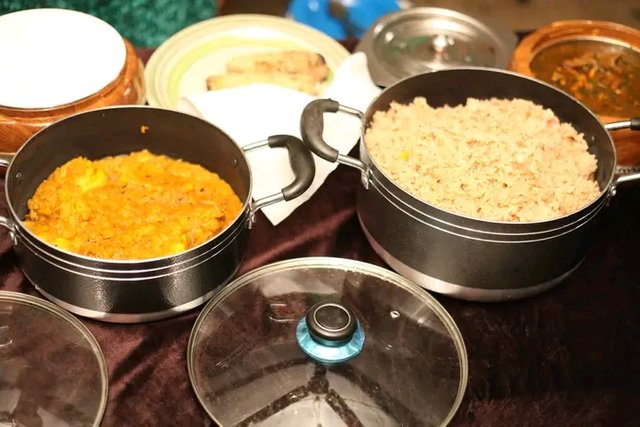My village Tradition
Hi steemit community!
Today, I want to share with you all one of the most important customs in our ibibio.
As a ibibio girl from Akwa ibom state. Growing up, I've always been proud of who I am and where I come from. Our tradition is really beautiful, and I love how it brings us together as a community.
One thing I live about our tradition is how we welcome people into our homes and community. Whenever students come for a field trip or visitors come to our village, we always make sure to give them a warm welcome. We'd say' Amedi o, sung idem," which means" Welcome, welcome!" In our local dialect. It's a way of showing love and respect our guests.
We also have this masquerade festival that happens every year. It's a big deal in our community, and everyone looks forward to it. But there's one rule that stands out, girls aren't allowed to look at the masquerade's face or stand close to them. If we do, it's considered an insult, and we're supposed to run away. I've heard that if a girl doesn't run, or fight with the masquerade's it might affect her chances of having a male child in the future. I don't know how true that is, but it's what I've been told.
When it comes to marriage,we have some really interesting customs. For instance,when the first daughter wants to get married, her husband has to buy a ram for the elders. They'd then slaughter the ram and eat it as a way of blessing the union. Before they slaughter the ram, they'd ask" Nkim mmi?" Which means should we kill it here??"if they're happy with the marriage arrangement, they'd say yes.
There's another thing,if a girl has a baby out of wedlock, Her father is not supposed to eat the marriage goat when a girl gets married. I know it sounds a bit weird, but that's just how it is. It's like a way of teaching us to respect ourselves and our bodies.
When a woman's husband dies, They widow aren't supposed to cut their hair. We don't do it. But we'd wear black or dark clothes and avoid social gatherings for some time, it's a way of showing love and respect to our late husband.
I love our tradition because it's all about community and respect. We look out for each other and make sure everyone feels included. Of course, there are some things that might seem strange to outsiders, but for us, it's just how things are.
Another one is "Udia ibenge". Before the marriage ceremony starts, the bride's family prepares a varieties of delicious native foods to send to the groom's family. This tradition is a way of showing love and respect to the groom's family, and it's also a way introducing them to our culinary heritage.
The foods we prepare for" udia ibenge" are amazing! We cook ekpangkukwo,which is made with water yam, and asa iwa, which is cooked cassava. We also prepare ndita iwa yeh isip mmbakara, which is cooked and slice cassava with coconut, and eyop ke inó, which is palm fruit with salt. Others dishes include to ti nkpo, made with cassava, to atama soup, editan soup, asio, ekoki made with maize,and Anem, which is sweet yam. Ufofop ukom (plantian) Etc. These foods are all carefully prepared and presented to the groom's family as a symbol of our love and hospitality.
"Udia ibenge" is more than just a food tradition, it's a way of building relationship and strengthening bonds between families.when we send these foods to the groom's family, it's a sign that we're welcoming them into our family and showing them that we care. it's a beautiful tradition that I feel lucky to be a part of.
In out culture,food is not just about eating, it's about sharing love, respect, and community. When we prepare" udia ibenge", we're not just cooking food, we're showing our love and appreciation for the people we're about to join with in marriage. It's a tradition that'll always treasure, and I'm grateful to be able to share it with you today.
I hope you enjoyed learning about"udia ibenge" and the importance of food in our ibibio culture. It's a tradition that's full of love, respect, and community,and it's something that'll always be proud to share with other.
As I grow older, I realize more and more how important our tradition is. It's what makes us who we are, and it's what sets us apart from other cultures. I'm proud to be an ibibio girl,and I'll always cherish my tradition.
I hope you enjoyed reading about my culture and tradition. It's not always easy to put into words, but I hope I was able to share it with you all.
Some of the pics are from Facebook
Thank you so much for reading!
Inviting
@etoro
@dreamgayle
@imohmitch
@mr-peng
@peachyladiva





I like this tradition. The strength of your cultural tradition lies in its core values. It also shows the power of community. These traditions unite people.
Upvoted! Thank you for supporting witness @jswit.
I am very flattered that you have told with so much emotion part of the traditions of your culture.
I also like the fact that all these customs are carried out with the purpose of strengthening the bonds of friendship with the family of your future husband. At the end of the day, he will be the family you will share with for the rest of your life.
I have been able to read with enthusiasm everything you have shared here.
Thank you so much 😊
Please modify the title of your entry. You should not place a "contest", only your title will be fine.
You should not go beyond the labels either. The correction has already been placed, edit and modify please. @kwinberry
Have edited the title.
Thank you for the correction.
Thanks for making the correction.
since @kwinberry refuses to come up with an original comment her post will be muted if this isn't done within 2 days. I asked more than once.
If you don't change the title and refuse to pay attention your post will be muted.
You also do not have the right to use the hashtag #newcomer since you are not and this is hashtag abuse!
I didn't know please 🙏
Have edited it.
I'm so sorry.
Хорошие традиции. А если семье мужа не понравится еда от невесты?
Я, когда выходила замуж, почти не умела готовить еду, училась уже будучи замужем;)